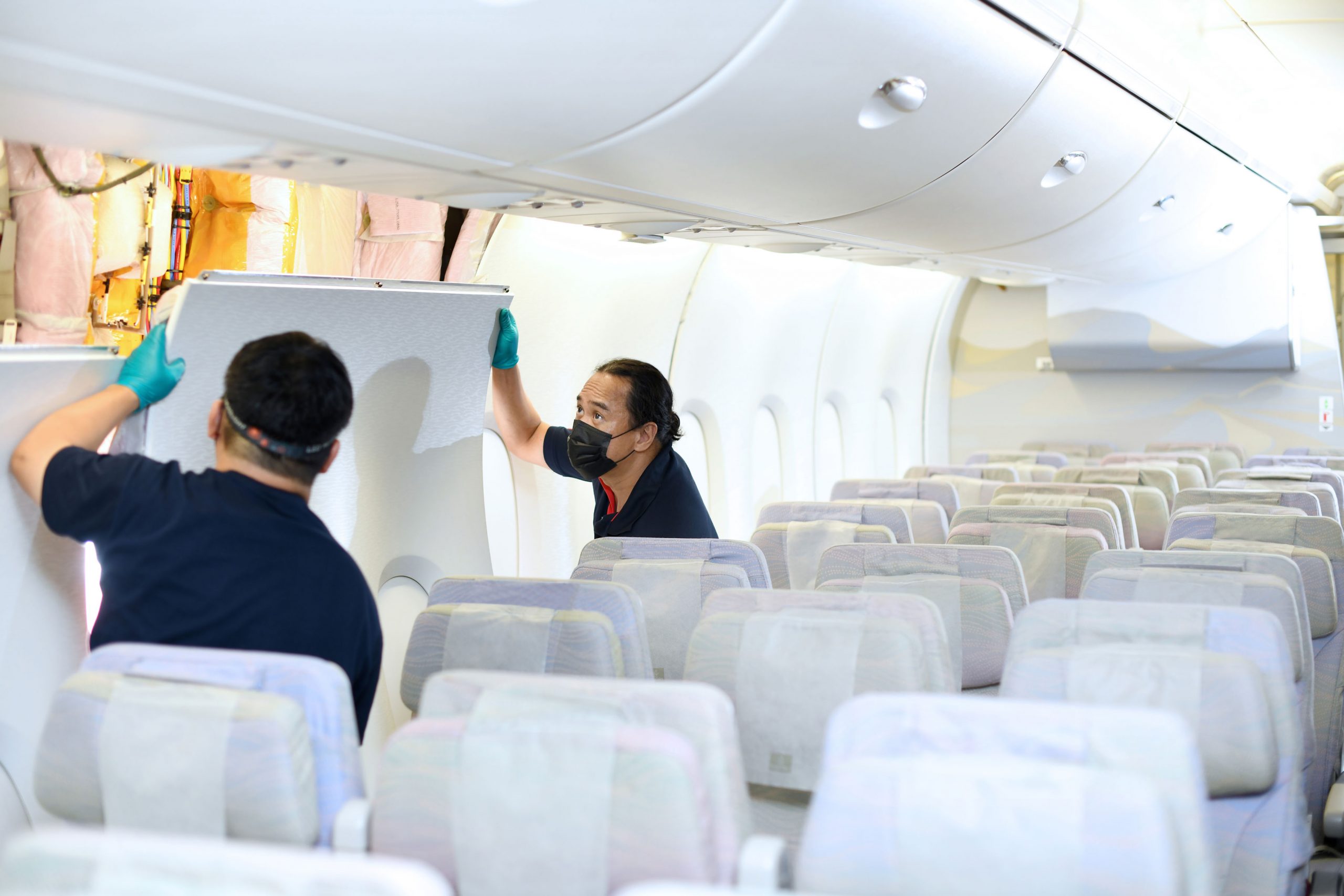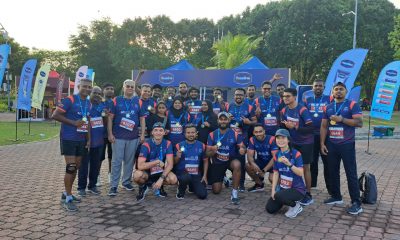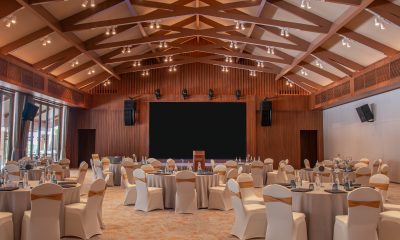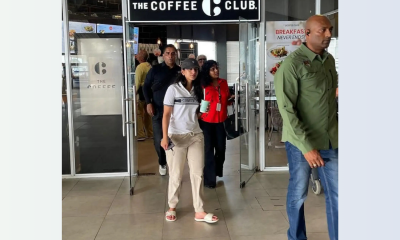International
No beds, packed morgues: Mumbai hospitals near collapse

Packed morgues, bodies in wards, patients forced to share beds and medical workers run ragged: Mumbai’s war against coronavirus has pushed the Indian city’s hospitals to breaking point.
Ravi, 26, had to change his mother’s diapers himself as she lay dying from the disease in the huge Lokmanya Tilak Municipal General Hospital, better known as Sion.
“They would just give us medicines and leave,” Ravi (not his real name) told AFP. Staff in the 1,300-bed facility were “overworked and tired”, he said, with sometimes three patients per bed.
Now he too has contracted the virus and is in another hospital — but only after four facilities refused to admit him. “We don’t have the infrastructure for this disease,” he said.
The state-run Sion hospital has become a byword for the stunning failure of Mumbai — home to billionaires, Bollywood and slums — to cope with the pandemic.
A video widely shared on social media and shown on Indian TV showed corpses wrapped in black plastic left on beds in a ward where patients are being treated.
Authorities said they were investigating the footage.
‘So many cases’
With space at a premium, and relatives too afraid or unable to claim their dead because they are themselves in quarantine, disposal of coronavirus corpses is not easy, doctors say.
But dealing with the sick is much harder.
“We don’t have enough beds to manage so many cases. The emergency area gets full in a matter of hours,” Aditya Burje, a junior doctor working night shifts at Sion hospital, told AFP.

The hospital’s proximity to India’s biggest slum Dharavi makes it a key battleground in the fight against the pandemic.
“In March there were just one or two suspected cases a day. It all seemed to be under control. Then the situation drastically changed,” the 25-year-old said.
By the end of April, Burje and his colleagues were overwhelmed.
“We were seeing 50-100 patients a day, 80 per cent of whom would turn out to be positive and many would need to be on oxygen,” he said.
Like many doctors at state-run hospitals, Burje, who gets a $700 monthly stipend, has not been paid since India went into lockdown in late March.
He has not had a night off in two months.
With nearly a third of his medical school cohort at the hospital diagnosed with coronavirus, he admitted he was scared to go to work.
“If something happens, who will take care of me?”
‘System exploding’
Sion hospital is not alone in India’s financial capital. And everyone — from medical students to doctors with decades of experience — is struggling.
Intensive care specialist Deepak Baid, who runs a private hospital in north Mumbai, volunteered to help at a state-run medical facility, Rajawadi Hospital.
But though it is only equipped to handle patients with moderate symptoms, doctors there routinely end up treating critically ill people, Baid said.

Even clinicians specialising in fields like dermatology or orthopaedics are being hit with caseloads of patients they are not qualified to treat.
“We can’t send (patients) to other better-equipped hospitals because they have no beds and so we do what we can,” he told AFP.
“The system is under a lot of pressure, it’s exploding,” he said.
Flimsy protective equipment has made sanitation workers fearful of tackling tasks such as changing sheets used by coronavirus patients, Nilima Vaidya-Bhamare, another doctor, told AFP.
‘Utterly neglected’
Mumbai has 4,500 beds for coronavirus patients, according to Daksha Shah, a senior health official with the city authority.
“We are expanding capacity all the time,” she told AFP, pointing to efforts to build a 1,000-bed field hospital in a commercial hub.
Authorities are also setting up intensive care units inside schools.
But with Mumbai so far registering around 18,000 cases, a fraction of its 18-million-strong population, fears are growing that India’s worst-hit city is unprepared for a potential surge.
India spends less than two per cent of its GDP on healthcare.
As of 2017, India had 0.8 doctors per 1,000 people, around the same level as Iraq, according to the World Bank. China has 1.8 per 1,000, and the United States 2.6.
Many of the problems highlighted by the pandemic have been festering for a long time, Vaidya-Bhamare said, from a lack of basic supplies such as soap to overburdened staff.
“I graduated in 1994 and government hospitals were utterly neglected then,” she said. “Why does it take a pandemic to wake people up?”
Content and photos: AFP
International
Nika Zorjan’s ‘V Postelji’ music video showcases timeless beauty of Maldives

Released just three weeks ago, Nika Zorjan’s latest music video, ‘V Postelji’ (meaning “In Bed”), has captivated audiences with its stunning cinematography set against the breathtaking backdrop of the Maldives. Directed by videographer Niko Karo, who accompanied Nika to film the video, the project was organised by Moji Maldivi, an agency based in Slovenia dedicated to promoting the Maldives as a premier holiday destination in Balkan region.
The video beautifully captures Nika strolling through serene pathways shaded by iconic coconut palm trees at Villa Park, later walking along the sun-kissed beaches of Villa Nautica, and finally enjoying the golden sunset on a bed at the beach of Furaveri Maldives. Each scene showcases the natural beauty and tranquil ambiance of the Maldives, enhancing the emotional depth and visual splendour of the music video.
Nika Zorjan, renowned as a Slovenian pop star and Eurovision contestant, has also gained fame for her cover songs, including her most popular rendition of Sia’s Cheap Thrills, which has amassed nearly 50 million views on YouTube, with over 60 million total views on the platform. “Shooting a video in the Maldives is heavenly,” she added. Filmed in one of the world’s most captivating tourist destinations, the Maldives serves as more than just a scenic backdrop; it becomes an integral part of the video’s narrative.
V Postelji not only showcases Nika Zorjan’s musical prowess but also pays homage to the Maldives’ timeless allure and cultural richness. The video has resonated deeply with audiences, garnering praise for its artistic vision and the mesmerising beauty of the Maldivian landscape. The lush greenery, crystal-clear waters, and pristine beaches depicted in the video create a sense of paradise that complements the song’s evocative lyrics.
As viewers continue to immerse themselves in the captivating visuals and emotive melodies of V Postelji, it reinforces the Maldives’ reputation as a destination where natural beauty and tranquility converge effortlessly. Nika Zorjan’s collaboration with Niko Karo underscores their shared appreciation for the Maldives’ serene ambiance and its ability to inspire creativity and emotional expression. This partnership, facilitated by Moji Maldivi, highlights the agency’s dedication to showcasing the Maldives as an unparalleled holiday destination to the Balkan market.
Featured
Emirates undertakes largest known fleet retrofit project

Emirates has kick-started its plans to upgrade the entire interior cabins of 120 Airbus A380 and Boeing 777 aircraft – two of the largest commercial aircraft types in service today.
This ambitious project, representing a multi-billion dollar investment to ensure Emirates’ customers “fly better” for the coming years, officially commences in November and is managed entirely by Emirates’ Engineering team.
The target is to completely retrofit four Emirates aircraft from start to finish every month, continuously for over 2 years. Once the 67 earmarked A380s are refreshed and back in service, 53 777s will undergo their facelift. This will see nearly 4,000 brand new Premium Economy seats installed, 728 First Class suites refurbished and over 5,000 Business Class seats upgraded to a new style and design when the project is complete in April 2025.
In addition, carpets and stairs will be upgraded, and cabin interior panels refreshed with new tones and design motifs including the iconic ghaf trees which are native to the UAE.

No other airline has handled a retrofit of this magnitude in-house, and there’s no blueprint for such an undertaking. Therefore Emirates Engineering teams have been planning and testing extensively, to establish and streamline processes, and identify and address any possible snags.
Trials began on an A380 in July, where experienced engineers literally took each cabin apart piece-by-piece and logged every step. From removing seats and panelling to bolts and screws, every action was tested, timed and mapped out. Potential impediments to completing the installation of Emirates’ new Premium Economy Class or the retrofit of the remaining three cabins in just 16 days were flagged and documented for expert teams to review and address.
As part of the programme, new purpose-built workshops will be set up at Emirates Engineering to repaint, re-trim and re-upholster Business and Economy Class seats with new covers and cushioning. First Class suites will be carefully disassembled and sent to a specialised company to replace the leather, arm rests and other materials.
From the trials, Engineers discovered several unexpected solutions for instance: that existing food catering trucks could be easily repurposed to move parts destined for refurbishment from the aircraft to the workshop for their refresh, as these vehicles had doors of the right width and offer sufficient space.
Until the retrofit programme starts in earnest in November, a cross-disciplinary team has been assembled to regularly review the planning process, address any issues, and track updates on various aspects of the project such as procurement, staffing, and training.
Emirates’ new Premium Economy cabin class, which offers luxurious seats, more legroom, and a service to rival many airlines’ business offering, is currently available to Emirates customers travelling on popular A380 routes to London, Paris, Sydney. More customers will be able to experience the airline’s new Premium Economy cabins starting from year end, as the retrofit programme picks up momentum.
Featured
Eleanor helps over 30 Maldives hotels elevate guest services

Eleanor has been named as one of the top 10 concierge software providers globally.
Based on accurate, timely reviews from real users, the HotelTechAwards rank the world’s best hotel software firms and products and it also provides hoteliers direct access to a growing network of hotel technology professionals and decision-makers.
“The guest experience is the cornerstone of our platform. Our unified resort wide solution, Eleanor, has been built for resorts off the back of many years working in the industry and addresses the needs of both Sales and Marketing departments and perhaps just as importantly, the operational requirements of the team on the ground at the property. The days of resorts working with disjointed systems are now behind us,” says Darren Caple, co-founder and CEO.
“We are on a mission to make the guest’s resort experience as easy and as frictionless as possible. Whereas traditional providers in the market have come at this purely from a guest communication perspective, our background in resorts has allowed us to combine this basic requirement with the streamlining of operational processes. The result is truly a resort wide solution that removes the need for countless different systems to be deployed.
Eleanor allows resorts to deliver consistent, superior service levels to guests across all stages of their journey with contactless features helping to alleviate sensitive touch-points in the post pandemic period. More than 30 properties in the Maldives use our Eleanor platform to help butlers and guest services elevate the guest experience. These properties are seeing an increase in incremental revenue by over 30% and operational efficiencies of 600+ man hours per month. We are also beginning to roll out the platform in some Caribbean properties!”
Eleanor is making waves in the hospitality industry by pushing the conventional limits of what a resort guest app can achieve through its unique ability to facilitate direct bookings for services and activities. The traditional ‘request to book’ feature that is common amongst almost all other hotel apps is removed by a power booking and operational platform sitting at the heart of the solution that covers all the resorts’ departments. It’s this module which realises enormous operational benefits and insights for the resort.
“We, at Eleanor, are humbled and honoured that our clients have provided such positive reviews. Feedback from our clients, partners and hoteliers are incredibly valuable for us and we will continue to improve our offering and services”, said Caple.
To celebrate this success, Eleanor is currently offering resorts a free one month trial, together with free setup and training and discounted monthly fees.
Eleanor, founded in 2018 and has its headquarters in the United Kingdom. Created from over 15 years of hands-on expertise, Eleanor allows resorts to deliver consistent, superior service levels to its guests across all stages of their journey with contactless features helping to alleviate sensitive touch-points in the post pandemic period. Eleanor also helps to unlock operational efficiencies and boost incremental revenue and guest loyalty.
Hotel Tech Report’s Best Concierge Software 2022 Runner Up, reviewed as a preferred and reliable hotel software product by the global hotelier community.
For more information, visit www.eleanorapp.com.
-

 Action1 week ago
Action1 week agoBestbuy Maldives supports health, wellness as Main Sponsor of MNU Marathon 2026
-

 Cooking1 week ago
Cooking1 week agoMaagiri Hotel invites guests to celebrate Ramadan with daily Iftar
-

 Awards1 week ago
Awards1 week agoEllaidhoo Maldives secures HolidayCheck Gold Award for second consecutive year
-

 Love1 week ago
Love1 week agoRomance in nature: Valentine’s week at Eri Maldives
-

 News6 days ago
News6 days agoVentive Hospitality aligns Maldives portfolio with Green Fins marine sustainability platform
-

 Business6 days ago
Business6 days agoFeydhoo Hall opens at dusitD2 Feydhoo Maldives as new event space
-

 Awards1 week ago
Awards1 week agoReethi Faru Resort recognised with HolidayCheck Award 2026
-

 Awards1 week ago
Awards1 week agoThe Ritz-Carlton Maldives, Fari Islands secures Forbes Five-Star rating for fourth consecutive year















